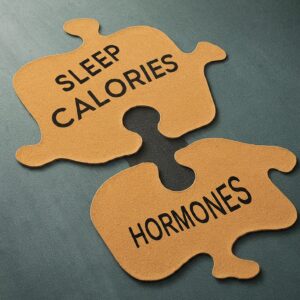Introduction
Counting calories and endless workouts are often seen as the sole keys to weight loss. However, our bodies are complex, and focusing only on calories in and calories out is missing the bigger picture. Sleep patterns, chronic stress, and hormonal imbalances can significantly hinder your efforts, even with the perfect diet plan. Let’s explore the hidden players influencing your weight loss journey.
Sleep Deprivation: The Weight Loss Saboteur
Sleep is crucial for overall health, but its impact on weight management is particularly profound. Here’s how lack of sleep works against you:
- Disrupted Hunger Hormones: Sleep deprivation decreases leptin (signals fullness) and increases ghrelin (stimulates appetite), making you crave junk food.
- Increased Cortisol: Lack of sleep raises your stress hormone, cortisol, promoting fat storage, especially around the abdomen.
- Poor Choices & Portion Control: When sleep-deprived, your decision-making suffers. Reaching for sugary, high-fat snacks for a quick energy fix becomes more tempting.
- Less Energy for Exercise: Feeling exhausted means you’re less likely to engage in the physical activity that supports your goals.
Stress: Not Just a State of Mind
Chronic stress wreaks havoc on your metabolism and weight loss efforts in a number of ways:
- Elevated Cortisol: As mentioned, cortisol from stress encourages fat storage and increases cravings for unhealthy comfort foods.
- Emotional Eating: Stress often triggers turning to food for comfort, not true hunger. This can become a hard-to-break cycle.
- Disrupted Digestion: Stress can lead to digestive issues, interfering with the proper absorption of nutrients.
- Interferes with Sleep: Stress-related anxieties keep many up at night, adding a double-whammy to their weight loss challenges.
The Hormone Factor
Hormones are powerful messengers in the body, with several playing a significant role in weight regulation:
- Insulin: This hormone controls blood sugar. Insulin resistance (cells don’t respond properly) makes weight loss hard and raises the risk of type 2 diabetes.
- Thyroid Hormones: Low thyroid function (hypothyroidism) slows metabolism, leading to weight gain, fatigue, and other issues.
- Sex Hormones: Hormonal shifts during menopause for women, or low testosterone for men, can influence fat distribution and metabolism.
- Leptin & Ghrelin: We’ve discussed these hunger/fullness hormones, but imbalances can lead to constant hunger and cravings.
- Polycystic Ovary Syndrome (PCOS): A hormonal condition in women often causing insulin resistance, weight gain, and irregular periods.
Strategies for Addressing Sleep, Stress, and Hormones
While these factors seem daunting, there’s much you can do to get them on your side:
- Sleep Hygiene:
- Consistent bedtime/wake times
- Dark, quiet room
- No screens before bed
- Limit caffeine later in the day
- Stress Management:
- Yoga, meditation, deep breathing
- Time in nature
- Therapy or counseling
- Finding joy and healthy outlets
- Nutrition that Supports Balance:
- Whole foods, focus on fiber and protein
- Limit added sugars & unhealthy fats
- Adequate hydration
- Discuss supplements ONLY with a doctor
- Movement Matters:
- Find enjoyable exercise, strength training is key
- Small bursts count (short walks, etc.)
- When to See a Doctor: If suspecting a medical issue (hormonal imbalance, sleep disorder), don’t self-diagnose. Consult a professional.
Additional Factors to Consider
It’s important to remember weight loss is multifaceted. Consider these too:
- Gut Health: Your gut microbiome plays a role in nutrient absorption, metabolism, and even cravings. Focus on prebiotic and probiotic foods.
- Medications: Some medications can have weight gain as a side effect. Discuss concerns with your doctor.
- Mindset: Belief in yourself matters! Ditch the “all-or-nothing” thinking, and celebrate ANY progress towards health goals.
The Role of Sleep in Weight Management:
- Understanding the Sleep-Weight Connection: Chronic sleep deprivation can lead to weight gain and hinder weight loss efforts.
- Hormonal Imbalances: Lack of sleep can disrupt the balance of hunger hormones, ghrelin and leptin, leading to increased appetite and calorie intake.
- Impact on Metabolism: Poor sleep can cause metabolic grogginess, reducing the body’s ability to process insulin and store fat.
Stress and Its Effects on Weight:
- Cortisol and Weight Gain: Chronic stress leads to elevated cortisol levels, which can promote fat storage and weight gain.
- Emotional Eating: Stress often triggers emotional eating, leading to the consumption of high-calorie, comfort foods.
- Disrupted Digestion: Stress can negatively affect the digestive system, impacting nutrient absorption and metabolism.
Hormonal Influences on Weight Loss:
- Thyroid Function: The thyroid gland regulates metabolism, and its dysfunction can lead to weight gain.
- Sex Hormones: Fluctuations in estrogen and testosterone can affect body fat distribution and muscle mass.
- Insulin Resistance: Hormonal imbalances can lead to insulin resistance, making it harder to lose weight.
Integrating Sleep and Stress Management into Weight Loss Strategies:
- Prioritizing Sleep: Strategies for improving sleep hygiene and quality to support weight loss.
- Managing Stress: Techniques such as mindfulness, meditation, and exercise to reduce stress levels.
- Balancing Hormones: Dietary and lifestyle changes that can help regulate hormonal imbalances.
Conclusion
Weight loss is a complex process influenced by far more than just diet and exercise. Addressing sleep, stress and hormonal balance empowers you to get the sustainable results you’re striving for. Treat your body with kindness, give it the rest it needs, find healthy ways to manage stress, and prioritize nourishing choices. When you approach wellness holistically, reaching and maintaining a healthy weight becomes more attainable and more enjoyable.

